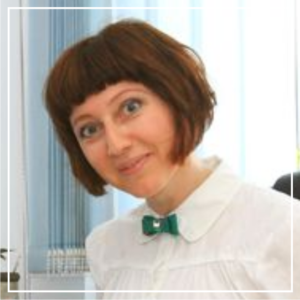Associate Professor
Nicoleta SĂLCUDEAN, PhD
nicoleta.sălcudean@ubbcluj.ro

Ileana Nicoleta Sălcudean has held a Ph.D. in Sociology since 2012, with a thesis entitled “Cultural Policies and Identity Constructions in the European Context,” and since 2019, a habilitation certificate in the field of doctoral studies in Cinematography and Media, with a thesis entitled “Film and Creative Industries.” Her areas of interest include cultural studies, sociology of culture, and creative industries.
Since 2014, she has been an Ambassador for CreArt at the Fundación Municipal de Cultura, Ayuntamiento de Valladolid (ES). She is a member of the European Network Association (since January 2018) and the Ekphrasis Research Center (since 2016), as well as an Associate Member of the Center for Applied Philosophy, Faculty of History and Philosophy, UBB (since 2015). She served as the director of the Continuing Education and Lifelong Learning Center at UBB (2012-2014). She has been awarded the UEFISCDI Prize for Research Results in 2017. She has received numerous grants and research stays (Wheaton College; Venice Biennale; University of Valencia; Otto-von-Guericke University Magdeburg; Institute of Higher European Studies in The Hague; Sidney Sussex College; Cambridge University, Cambridge, etc.). She has managed projects or been part of national and international project teams (POCU, STARUBB, AFCN, UEFISCDI, POS-DRU, Inside Europe). She has participated as a guest, trainer, expert, or evaluator in important international conferences, teaching mobilities, and exchange of experiences.
PHD. RESEARCH TOPICS
I. Film genres (Themes, (super)heroes, politics and ideology, transformations in script structure, influences, identity and context).
II. Film sociology (Film representations/ Society. Social roles. Identities. Social structures. Interactions/ Social semiotics/ Influence of new technologies).
III. Creative industries (Cultural policies and identity construction/ Creative management/ Organizational aesthetics/ The creative city/ Country branding/ Film festivals).
IV. Creative Writing in the Audiovisual (Communication Intentionality/ Creative Writing/ Creative Reading/ Creative Writing for Online/ Intertextuality/ Visual Content Marketing).
BIBLIOGRAPHY
Film genres
- Gehring, D. Wes, Parody as Film Genre: ”never give up a saga even break”, Greenwood Press, USA, 1999.
- Grant, Barry Keith Grant, Film genre: from iconography to ideology, UK, Wallflower Press: 2007.
- Jung, Berenike, Narrating Violence in Post 9/12 Action Cinema. Terrorist Narratives, Cinematic Narration and Referentiality, VS Verlag für Sozialwisenschaften, 2010.
- Tasker, Yvonne, Action and Adventure Cinema, Routledge, London-New York, 2004.
- Cameron, Keih (ed.), Humour and History, Intellect Books, Oxford, 1993.
- Hokenson, Jan Walsh, The Idea of Comedy: History, Theory, Critique, Rosemont Publishing and Printing Corp., USA, 2006.
- Martin, A. Rod, The Psychology of Humor: An Integrative Approach, Elsevier Academic Press, London/ Ontario 2010.
Film sociology
- Chelcea, L., ”A face familiarul exotic şi exoticul familiar: o hartă a cercetării antropologice din România/ Making Exotic Familiar and Familiar Exotic: A Map of Anthropological Research in Romania”, Sociologie Românească, 7(3), 2009, pp. 13-19.
- Cresswell, Tim; Dixon, Deborah (eds.), Engaging Film. Geographies of Mobility and Identity, Rowman and Littlefield Publishers, USA, 2002.
- De la Fuente, Eduardo, ”The `New Sociology of Art’: Putting Art Back into Social Science Approaches to the Arts”, Cultural Sociology, vol. 1, nr. 3, 2007.
- Fuery, Kelly, New Media, Culture and Image, Palgrave Macmillan, USA, 2009.
- Halliday, M.A.K., Language as a Social Semiotic, Edward Arnold, London, 1978.
- Joyce, Rosemary A. ”Archeology of the Body”, Anual Review of Anthropology, 34, 2005.
- Sutherland, Jean-Anne; Feltey, Kathryn, Cinematic Sociology: Social Life in Film, Pine Forge Press, 2010.
- Vaetisi, Șerban, Noile teorii etnografice și conceptul de descriere a culturii, Efes, Cluj-Napoca, 2008.
- Vallejo, Aida; Peirano, Maria Paz (eds.), Film Festivals and Anthropology, Cambridge SP, 2017.
Creative industries
- Caves, R.E., Creative Industries: Contracts between Arts and Coomerce, Harvard University Press, USA, 2002.
- Flew, Terry, The Creative Industries: Culture and Policy, SAGE, London, 2012.
- Fryatt, Anthony; Kemp, Roger, “Motel: Reflections on a Film Production/interior Design Collaboration.” TEXT, 2011.
- Golding, P., Murdock, G., Culture, Communications and Political Economy, in Curran J. and Gurevitch M. (eds.), Arnold, London, 2000.
- Hesmondhalgh, D., Pratt, A. C., ”Cultural Industries and Cultural Policy”, International Journal of Cultural Policy, 11/ 1, 2005.
- Lostritto, Carl, “Rendering Representational Atmosphere Appropriating Formalisms Around Invisible Objects in Film.” Architectural Design, vol. 92, no. 2, 2022, pp. 90–95.
- O’Connor, J., Wynne, D. (eds.), From the Margins to the Centre: Cultural Production and Consumption in the Post-Industrial City, Ashgate, Aldershot, 1996.
- Smith-Shank, Deborah L., (ed.), Semiotics and Visual Culture: Sights, Signs, and Significance, National Art Education Association, Reston, VA, 2004.
- Sălcudean, Ileana-Nicoleta, Politicile culturale: între București și Bruxelles, Cluj-Napoca: Risoprint, 2016.
Creative Writing in the Audiovisual
- Dawson, Paul, Creative Writing and the New Humanities, Routledge, London/ New York, 2005.
- Donnelly, Dianne, Establishing Creative Writing Studies as an Academic Discipline, Library of Congress, UK, 2012.
- May, Steve, Doing Creative Writing, Routledge, USA, 2007.
- McGurl, Mark, The Program Era: Postwar Fiction and the Rise of Creative Writing , Harvard University Press, USA, 2009.
- Jenkings, Henry; Ford, Sam; Green, Jashua, Spreadable Media, New York University Press, 2013.
- Richardson, John; Gorbman, Claudia și Vernallis, Carol, The Oxford Handbook of Audiovisual Aethetics, Oxford University Press, 2013.
- Sălcudean Ileana-Nicoleta, Stănescu Emma-Teodora, Manual de Scriere Creativă, Presa Universitară Clujeană, Cluj-Napoca, 2014.
